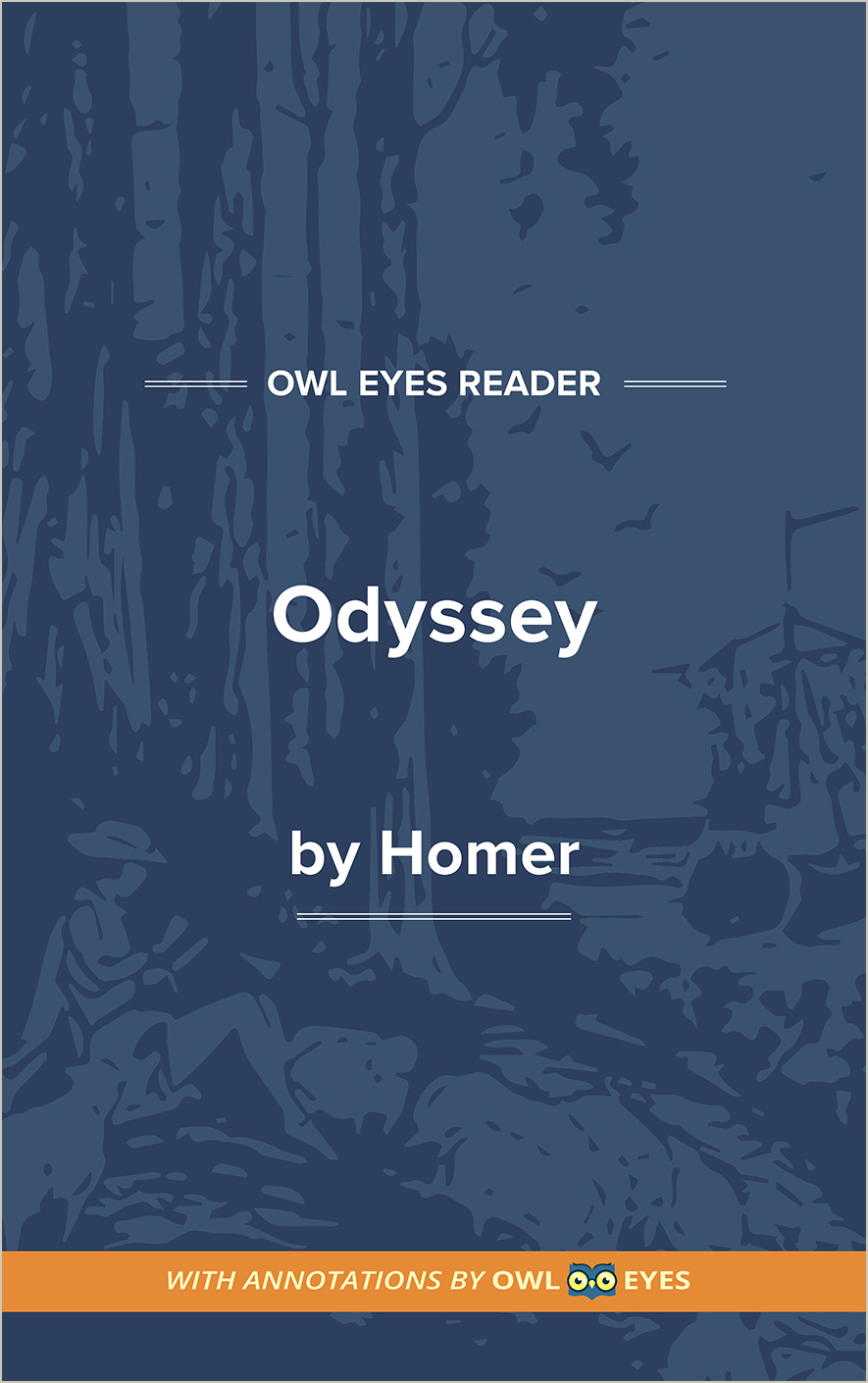Analysis Pages
Facts in The Odyssey
Facts Examples in The Odyssey:
Book I
🔒"Ithaca..." See in text (Book I)
"daughter of Zeus..." See in text (Book I)
"to beg poison for his arrows..." See in text (Book I)
Book III
🔒"Pherae..." See in text (Book III)
"and sprinkling the barley meal..." See in text (Book III)
"Aegis-bearing Zeus..." See in text (Book III)
"Trito-born..." See in text (Book III)
"Cauconians..." See in text (Book III)
"Philoctetes..." See in text (Book III)
"for I never yet saw the gods so openly fond of anyone as Athena then was of your father..." See in text (Book III)
"the open sea to Euboea..." See in text (Book III)
"The son of Tydeus..." See in text (Book III)
"Tenedos..." See in text (Book III)
"Amphitrite..." See in text (Book III)
"hecatomb..." See in text (Book III)
"Thrasymedes..." See in text (Book III)
"Poseidon, lord of the Earthquake..." See in text (Book III)
"Nestor at Pylos..." See in text (Book III)
Book IV
🔒"to cross over to Elis..." See in text (Book IV)
"the Trojan women..." See in text (Book IV)
"to Cyprus, Phoenicia and the Egyptians..." See in text (Book IV)
"city of Lacedaemon..." See in text (Book IV)
"hovered over her head saying..." See in text (Book IV)
"but she had no heart for sitting..." See in text (Book IV)
"Proteus..." See in text (Book IV)
"and the sheep lamb down three times a year..." See in text (Book IV)
Book V
🔒"Cadmus..." See in text (Book V)
"Pieria..." See in text (Book V)
Book VI
🔒"spinning her purple wool..." See in text (Book VI)
"and have nothing to do with any other people..." See in text (Book VI)
"the mountains of Taygetus or Erymanthus..." See in text (Book VI)
"Hypereia, near the lawless Cyclopes..." See in text (Book VI)
Book VII
🔒"yellow-haired Rhadamanthus to see Tityus the son of Gaia..." See in text (Book VII)
Book VIII
🔒"Pytho..." See in text (Book VIII)
"Sintians..." See in text (Book VIII)
"the sum I gave him for his baggage..." See in text (Book VIII)
"bound the oars to the thole-pins..." See in text (Book VIII)
Book X
🔒"Erebus..." See in text (Book X)
"cubit..." See in text (Book X)
"Pyriphlegethon and Cocytus (which is a branch of the river Styx) flow into Acheron..." See in text (Book X)
"the waters of Oceanus..." See in text (Book X)
"Pramnian wine..." See in text (Book X)
"so that we do not even know East from West..." See in text (Book X)
"West wind which was fair..." See in text (Book X)
Book XI
🔒"Thetis..." See in text (Book XI)
"Antilochus..." See in text (Book XI)
"Patroclus..." See in text (Book XI)
"Dionysus..." See in text (Book XI)
"Procris..." See in text (Book XI)
"Otus and Ephialtes..." See in text (Book XI)
"Orion..." See in text (Book XI)
"Leda the wife of Tyndarus..." See in text (Book XI)
"was a certain excellent seer..." See in text (Book XI)
"Castor breaker of horses, and Pollux..." See in text (Book XI)
"Epicaste mother of king Oedipus..." See in text (Book XI)
"Megara..." See in text (Book XI)
"Antiope, daughter to Asopus..." See in text (Book XI)
"sees and gives ear to everything..." See in text (Book XI)
"Sisyphus..." See in text (Book XI)
"Tantalus..." See in text (Book XI)
"by reason of a woman's bribes..." See in text (Book XI)
"Ajax..." See in text (Book XI)
"Cassandra..." See in text (Book XI)
"Maera and Clymene and hateful Eriphyle..." See in text (Book XI)
"Ariadne..." See in text (Book XI)
"Phaedra..." See in text (Book XI)
"Cimmerians..." See in text (Book XI)
Book XII
🔒"For six days my men kept driving in the best cows and feasting upon them..." See in text (Book XII)
"and using young oak-shoots instead of barley-meal..." See in text (Book XII)
Book XIII
🔒"When the bright star that heralds the approach of dawn began to show..." See in text (Book XIII)
Book XIV
🔒"as a burnt sacrifice to the immortal gods..." See in text (Book XIV)
Book XV
🔒"gold with amber beads..." See in text (Book XV)
"Syra that lies over above Ortygia..." See in text (Book XV)
"Elis, where the Epeans rule..." See in text (Book XV)
Book XVII
🔒"Dmetor by name, son of Iasus..." See in text (Book XVII)
"This was Argos, whom Odysseus had bred..." See in text (Book XVII)
Book XIX
🔒"he would then go back from them and shoot an arrow through the whole twelve..." See in text (Book XIX)
"Eteocretans, Dorians of three-fold race, and noble Pelasgi..." See in text (Book XIX)
Book XX
🔒"Sardinian fashion..." See in text (Book XX)
"Pandareus..." See in text (Book XX)
"among the Cephallenians..." See in text (Book XX)
Book XXI
🔒"scheming Cronus..." See in text (Book XXI)
"mighty Heracles..." See in text (Book XXI)
"Messene..." See in text (Book XXI)
"that had been given him by a friend whom he had met in Lacedaemon—Iphitus the son of Eurytus..." See in text (Book XXI)
Book XXII
🔒"shovelled up the blood and dirt..." See in text (Book XXII)
"taunted him..." See in text (Book XXII)
"kicked the stool with his feet..." See in text (Book XXII)
"pay you a fine worth twenty oxen..." See in text (Book XXII)
Book XXIV
🔒"be sure not to disgrace your ancestors..." See in text (Book XXIV)
"flew on our right hands..." See in text (Book XXIV)
"Alybas..." See in text (Book XXIV)
"seven talents of fine gold..." See in text (Book XXIV)
"He had on a dirty old shirt..." See in text (Book XXIV)
"the open Hellespont..." See in text (Book XXIV)
"the rock Leucas..." See in text (Book XXIV)
"THEN..." See in text (Book XXIV)

